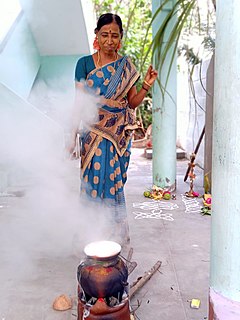| Pongal | |
|---|---|
 Pongal dish cooked for the occasion of the festival | |
| Observed by | Primarily Tamil Hindus in India, Sri Lanka, Malaysia, United States, Indonesia, Mauritius, Singapore, UK, South Africa, Canada, Australia, Gulf countries |
| Type | Hindu[1][2] |
| Significance | Harvest festival |
| Celebrations | Pongal (dish), decorations, home coming, prayers, processions, gift giving[3] |
| Date | First day of the 10th month of Thai (Tamil calendar) |
| 2024 date | Monday, 15 January[4] |
| Frequency | annual |
| Related to | Makar Sankranti, Magh Bihu, Uttarayana, Maghi, Maghe Sankranti, Shakrain |
Pongal (/ˈθaɪˈpoʊŋʌl/), also referred to as Thai Pongal, is a multi-day Hindu harvest festival celebrated by Tamils. It is observed in the month of Thai according to the Tamil solar calendar and usually falls on 14 or 15 January. It is dedicated to Surya (the solar deity in Hinduism) and corresponds to Makar Sankranti, the Hindu observance celebrated under many regional names throughout the Indian subcontinent. The festival is celebrated over three or four days with Bhogi, Surya Pongal, Mattu Pongal and Kanum Pongal, observed on consecutive days.
According to tradition, the festival marks the end of winter solstice, and the start of the sun's six-month-long journey northwards called Uttarayana when the sun enters Capricorn. The festival is named after the ceremonial "Pongal", which means "to boil, overflow" and refers to the traditional dish prepared from the new harvest of rice boiled in milk with jaggery. Mattu Pongal is meant for celebration of cattle when the cattle are bathed, their horns polished and painted in bright colors, garlands of flowers placed around their necks and processions. It is traditionally an occasion for decorating rice-powder based kolam artworks, offering prayers in the home, temples, getting together with family and friends, and exchanging gifts to renew social bonds of solidarity.
Pongal is one of the most important festivals celebrated by Tamil people in Tamil Nadu and other parts of South India. It is also a major Tamil festival in Sri Lanka and observed by the Tamil diaspora worldwide.
- ^ "Pongal (Hindu festival)". Encyclopedia Britannica. 2016. Retrieved 15 January 2023.
- ^ "Religious Festivals". Government of India. Retrieved 1 October 2022.
- ^ Cite error: The named reference
Beteillewas invoked but never defined (see the help page). - ^ "Pongal 2024". Retrieved 5 January 2024.
- ^ "Public holidays for 2020 announced, Tamil Nadu Government". The Hindu. 23 October 2019. Archived from the original on 2 November 2020. Retrieved 30 October 2019.